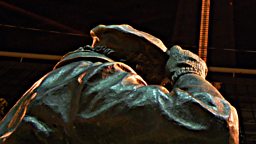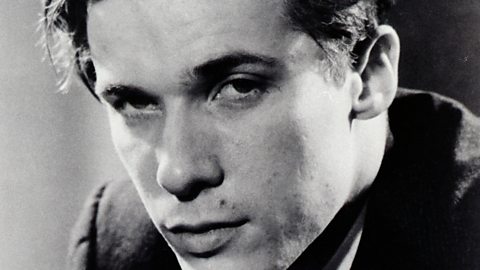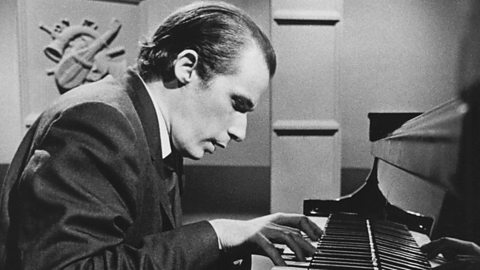The most unknowable celebrity in history
There has perhaps never been a musician so simultaneously famous and yet unknowable as the Canadian pianist Glenn Gould. Since his death in 1982, a huge cult of personality has grown up around his name – not only because of his brilliance, but because of his somewhat unusual habits and behaviours.
Pianist James Rhodes travelled to Toronto in search of the real Glenn Gould for a new Radio 3 documentary. Here’s what he found.

Glenn Gould was an international superstar who rarely left his home town
He was born in Toronto in 1932, and despite being a global celebrity, chose to live there his entire life.
Toronto is one of those cities that doesn’t impose its city-ness on you
This deep attachment to his home city was reflected in an hour-long documentary he made in 1979 with the director John McGreevy, who remembers him as “Toronto’s most famous hermit”. Despite his fame, Gould famously shunned contact with strangers (and often with friends and acquaintances, too).
Canada’s Prime Minister Justin Trudeau sees the legacy of Glenn Gould as something that modern Canadians can learn from – both despite and because of his quirks.

Justin Trudeau on Glenn Gould: “He transcended Canadian modesty”
James Rhodes quizzes the Canadian PM on the legacy of one of Canada’s most famous icons.
Despite being a world-renowned pianist, he never practised
Sound engineer Lorne Tulk, Gould’s long-term collaborator and friend, confirms that Gould never practised the piano. Instead, he studied, learned and listened to his vast repertoire entirely “in his head”. To put that in context, most concert pianists spend hours every day practising – something Gould said he could never understand the need for.
Gould also had a photographic memory and was able to quote books he’d read years previously, even citing page numbers and paragraph references. “He was a very special human being,” says Tulk. “Einstein didn’t have anything on him.”
He abandoned a stellar career in performance to focus solely on recording
Gould was catapulted to global fame in the late 1950s by a series of brilliant international concert tours. But just a few years later, he retired from public performance and headed for the recording studio. “Recording is the future,” he said in a 1966 interview, aged just 34. “The concert hall as we know it is dead.”
The concert hall as we know it is dead
Whatever his public reasons for abandoning the stage, it’s clear that Gould was an intensely private person who hated the life of the concert pianist. Instead, he embarked on a torrid “love affair with the microphone”, pioneering important experimental recording techniques and later on branching out into broadcasting.
Gould’s micromanagement of his own music recordings was legendary. He and his producers would place microphones not just next to the piano, but in various nooks and crannies of the concert hall, creating unique soundscapes that fitted the way his mind heard the music.
His ideas about technology were decades ahead of his time
Gould was a classic early adopter, one of the first people in Canada to own a mobile phone. He was also ahead of the curve when it came to technology in the music industry. People who worked with him in back in the 1960s, 70s and 80s remember how he predicted the appearance of music streaming services like Spotify and phone-based recording technology.
His mind just seemed to go in one direction, and that direction was the future
“He loved the idea of doing things that would last,” says Lorne Tulk. “His mind just seemed to go in one direction, and that direction was the future.” Gould would almost certainly have been a fan of podcasting and social media – although he equally certainly would have struggled to compress his ideas into 140 characters.
He was an intense hypochondriac who avoided all forms of physical contact
Gould was extremely neurotic about his physical health and would go to great lengths to avoid germs. He would often be seen bundled up in coat, scarf, gloves and galoshes, even in warm weather.

Gould had a real aversion to physical contact of any kind, refusing even to shake hands and often wearing gloves. (His own hands, naturally, were insured by Lloyds of London.) His friend Margaret Pacsu remembers how he only ever hugged her once, when she burst into tears as he played her one of his documentaries.
Some of Gould’s acquaintances knew how to turn this behaviour to their advantage. Gould had an unattractive habit of calling up people in the middle of the night to monologue at them. Another friend, David Jaeger, joked that the best way to prevent this from happening was to sneeze, whereupon Gould would hang up in disgust.
Some people think that despite his vast achievements, Gould never really grew up
He would often eat the same meal (scrambled eggs on white toast) every night at 2am in the same diner, for weeks on end.
He shunned physical contact with people, but loved nothing more than to tussle on the floor with their dogs.
And although he was a passionate, eloquent speaker when it came to music, he was a terrible communicator when it came to interpersonal relationships, even with the people he was supposedly closest to.

Loving Glenn Gould
Lorne Tulk, Gould's long term collaborator, cries as he remembers his friend.
Some people have speculated that Gould may have had a form of autism
His unusual behaviours have led to decades of speculation as to whether or not he may have have had what used to be called Asperger Syndrome and is now known as autism spectrum disorder (ASD).

Did Glenn Gould have a form of autism?
His idiosyncratic habits led to decades of speculation; James Rhodes meets an expert.
It’s by no means a universal theory. One of Gould’s biographers, Kevin Bazzana, has argued that the evidence for the theory is too selective. But other friends and colleagues maintain that a proper diagnosis might have helped Gould and those around him better understand his behaviour and motivations.
It’s likely that we'll never know for sure, given that he has been dead for nearly 30 years. He died on 4 October 1982, aged 50, after a stroke.
James Rhodes learns more about the life and music of Glenn Gould in The Sunday Feature: Geeking Glenn Gould.
-
![]()
Geeking Glenn Gould
James Rhodes travels to Canada in search of the truth about his piano icon.
-
![]()
Canada 150
Browse a host of programmes celebrating the wonderful range and diversity of Canadian music and arts.
-
![]()
James Rhodes's Saturday Classics
James Rhodes presents more recordings by his boyhood hero, Glenn Gould.
-
![]()
Canada in Words and Music
Music and poems that reflect how Canada has been shaped by the arrival of settlers from all parts of the world.




